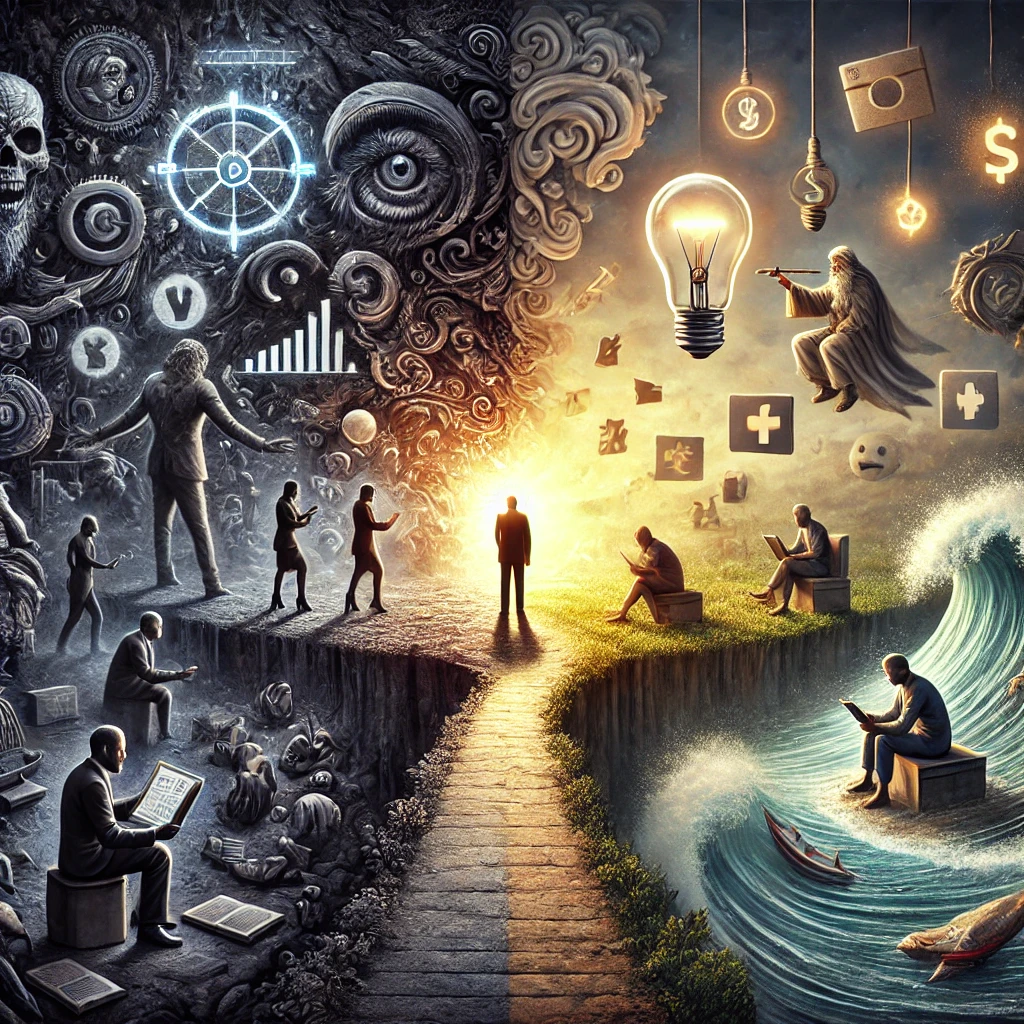Distinguish Your Well-Wishers from Your Enemies
Just by reading the title of the blog, you can get some idea of what I will be discussing. It's natural to want to know our enemies and distinguish them from our friends. On the surface, it seems like an obvious task that everyone would be able to manage—distinguishing between our well-wishers and those who have no regard for us. However, in our contemporary day-to-day life, it's not that easy to identify who is a friend and who is a foe. It's even regrettable that we are in this situation where we have to analyze who our friends or enemies are. It’s regrettable for me to even be writing about it. Unfortunately, times have changed so much that you cannot trust many people in this world.
Before I delve into listing all our enemies, I am going to go into history a bit to see what is driving our current assessments. I will discuss our natural biases and first look at them from a historical perspective to understand where our thinking comes from. Then, maybe we can justify our current-day thinking.
Historically speaking, when we were growing up in older times, there was a natural bias towards professionals. There was a conception that if a person has gone through extensive education, learning, and amassed considerable knowledge, then we ought to listen to that person. That knowledge can benefit us because, after all, we are listening to a professional. For example, you would assume that anything a doctor says would potentially be in your interest because this person has undergone rigorous education—from school to college, then medical school, residency, and possibly fellowships—and then acquired other experiences. Therefore, he must be saying something right. The same goes for other professionals like attorneys, financial advisors, accountants—anyone with professional qualifications. PhD holders have also undergone rigorous training, so if such a person is offering advice, it must be considered credible.
On the other hand, there are religious scholars who have their own curriculum and classification and have attained a status for themselves. We then assume that such a person might offer something enlightening that could help us in our day-to-day life. There is a natural tendency to listen to them and, evolutionarily speaking, this trend existed because knowledge was mostly transferred from our elders. Before the internet and books, we learned the tricks of the trade from our older relatives and community members. We gave them respect because our survival depended on them. If we did not respect them, they would not transfer their knowledge to us, and our own existence could be in jeopardy.
Historically, there was a great deal of respect for knowledge. This is why we see historical figures who sometimes have cult-like followers—because knowledge transfer was once a matter of life and death. Prosperity and comfort could hinge on whether an elder imparted their knowledge to you, and respect was a natural part of this exchange.
This forms one aspect of the evolutionary natural tendencies, or biases, we have towards others—whether they are elders, parents, or outside gurus and professionals. In contemporary times, these figures are often professionals with degrees or religious scholars on whom we previously depended for our survival.
Another aspect I want to touch on is how humans are naturally alert to anything unusual, as it could signify danger. For example, if we encounter something out of the ordinary, whether a strange sight or experience, it could indicate potential danger. From an evolutionary perspective, if we were walking by and noticed something unusual in a nearby bush, we would become highly alert. This response could be crucial, as there might be an animal or another danger hidden in the bush. Thus, we have an innate tendency to be vigilant about anything out of the ordinary—the stranger or more bizarre something is, the more attention it attracts.
These two phenomena are points I will continue to discuss in this blog, as they have significantly shaped our vulnerabilities. Returning to our main topic of distinguishing friends from foes, let's touch on a common human folly: our tendency to believe figures of authority. This tendency persists today, though historical figures like polymaths and gurus have been replaced with contemporary influencers and professionals.
Let's consider a common scenario: a doctor prescribes medication. We often follow these prescriptions without question. It's important to note that while many doctors and professionals are honest and diligent, there are exceptions. In this specific example, a doctor might have a vested interest in seeing a patient repeatedly. Chronic patients might be encouraged to return more often because each visit generates a fee. Thus, instead of curing the underlying disease, there might be a focus on treating symptoms to prolong the doctor-patient relationship. Similarly, pharmaceutical companies, fully aware of side effects, might push doctors to prescribe certain medications, or they might target consumers directly through advertisements.
Worst of all, nowadays anyone can create a YouTube video and start dispensing advice—be it health-related, financial, or otherwise. We sometimes listen to these individuals because they have created a persona of authority and amassed followers, associating them with credibility. This highlights our innate attraction to uniqueness or novelty, which influencers and companies exploit. They understand our desire for new stimuli each day, so they continually come up with more bizarre content to keep us engaged.
Because you seek something out of the ordinary, these creators often produce content that lacks substance. The more bizarre, awkward, obnoxious, and ridiculous the content, the more likely it is to attract viewers and followers. This leads to a situation where a layperson might associate the number of followers, hits, and views with authority. However, this content is often baseless, and the creators lack authenticity. Their success and visibility, driven by algorithms created by tech companies, are due to their ability to be obnoxious.
By definition, you should be skeptical of anyone who gains prominence on platforms like YouTube for being out of the ordinary. If they were discussing everyday matters, they wouldn't be as visible because algorithms prioritize content that stands out, not what is routine. Yet, in real life, most correct actions are mundane. Our biology hasn't changed in thousands of years. What was good for us a century ago remains beneficial, and what was harmful remains so. A healthy life is typically a boring, predictable, routine one—not driven by dramatic ups and downs.
The moral of the story is to disregard these "demigods" we've created. Avoid influencers who produce obnoxious videos or bizarre tweets. It's ironic in today's times, for example, why Donald Trump is so popular. He often says the most ridiculous things, and media outlets thrive on this because it sells, tapping into our natural curiosity for the sensational. After being bombarded with this nonsense, some people start to believe it's credible. But deep down, we know it's all nonsense.
These influencers then start giving advice on life, finances, health, etc., while in reality, they might be the most corrupt individuals. I once heard someone praising their family members as honorable, yet I know these individuals personally and am aware of significant flaws in their characters. Today, it seems we often overlook these flaws. We judge people by their social status, fame, and celebrity rather than their actual knowledge, wisdom, or strength of character. People should be judged by their actions and the nobility of their deeds.
Unfortunately, we've lost sight of this. Our "gods" are the demigods we've created and elevated to the status of prophets, then started worshipping them. In the process, they exploit us in every imaginable way. They are not our well-wishers but have their interests in mind. For instance, I suspect that executives in corporate meetings are fully aware that some products or services they offer are harmful or even lethal, yet they continue to promote them. They would discourage their families from using these products but sell them to the masses—a true crime against humanity. Social media companies, with their targeted algorithms, and food companies that produce addictive processed foods knowing their detrimental effects, illustrate this point. How can they be our friends? By definition, a friend is someone who chooses for you what they would choose for themselves. This simple, clear definition should help differentiate a true friend from an enemy. Unfortunately, there are not many people in this world who would act on this principle.
Our government is not going to take any actions. That's not going to happen because they themselves are puppets in the hands of the wealthy. No action is coming from that direction. Technological influences and all those platforms—news outlets, social media platforms, TV, Hollywood—all these sources will not offer sound advice. Everything is incentive-based. They will only act in ways that generate money for them. A company's number one priority is to increase the value of the shareholders' stock; it has nothing to do with your well-being. They don't care about you; you're just a number. If you can be used and manipulated in any way, you will be. So, no help is coming from these corporations. No help is coming from the government. We should be clear on that, and no help is coming from professionals or gurus either.
So, if that is the case, whom should we listen to? Well, in conclusion, I will say that, first of all, in order to know our friends and distinguish our foes from our friends, we should stop all unnecessary input. We must stop all the garbage that comes in. To make correct decisions, the input must be correct. Step number one is to stop listening to all these people and platforms, and don't fall for their tricks exploiting our weakness for novelty and their ability to alter our minds and dopamine levels.
100% stop being on those platforms, being in those circles. Stop listening to these so-called gurus, people whose advice is contingent, even if a person is 100% honest. If they're giving you advice and benefiting in one way or another from it, then there is bias in it, and you should be skeptical about it. That's step one, where we eliminate all the outside noise coming in. The second step is to acquire knowledge on your own from authentic, unbiased sources. Then, contemplate that knowledge. Think about it. Yes, in today's world, we don't have time. But once you eliminate all the noise from step one, you will have ample time to acquire knowledge and then think about it, analyze it, write about it. And then, implement the knowledge you have attained. Because there are no biases, and nobody is influencing it. Then, with rational reasoning, make a decision. Implement that decision in your day-to-day life. And then, once this happens, we will know who our friend is and who our enemy is.
Unfortunately, in this world, a general assessment is that 90% of the advice we get is influenced by interest. It doesn't mean that 90% of people are dishonest; it's just that the advice they render is influenced, or they themselves have been biased by a direct financial interest. They are achieving direct financial interest by endorsing certain services or products to us, whether directly or indirectly. So, let's hope we all can know our enemies, because in today's world, in order to succeed, we must distinguish who is our friend and who is our enemy.

